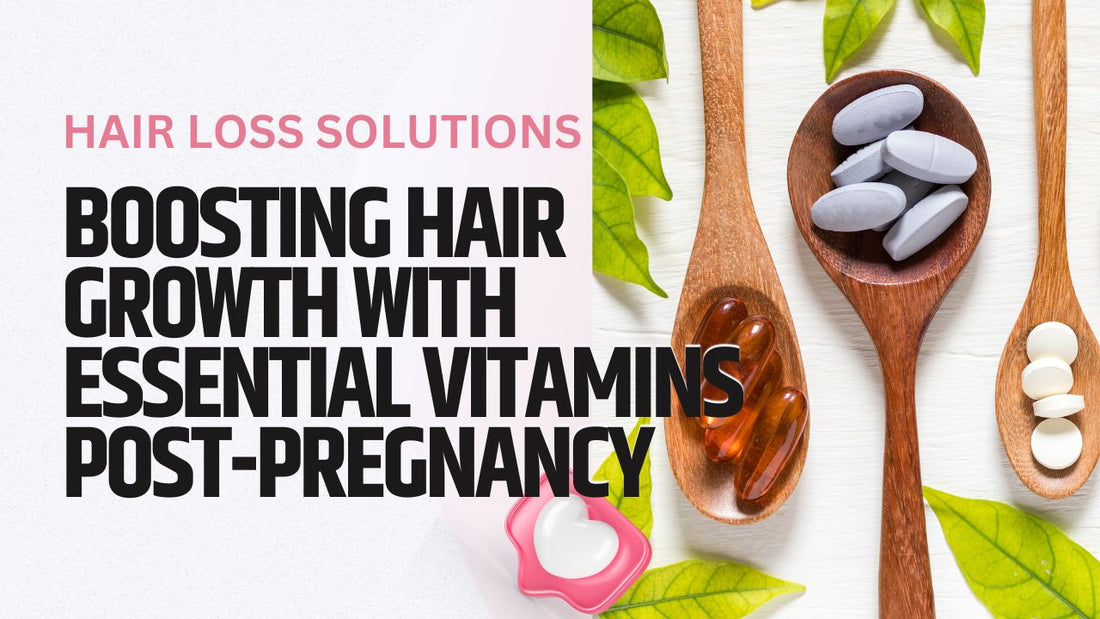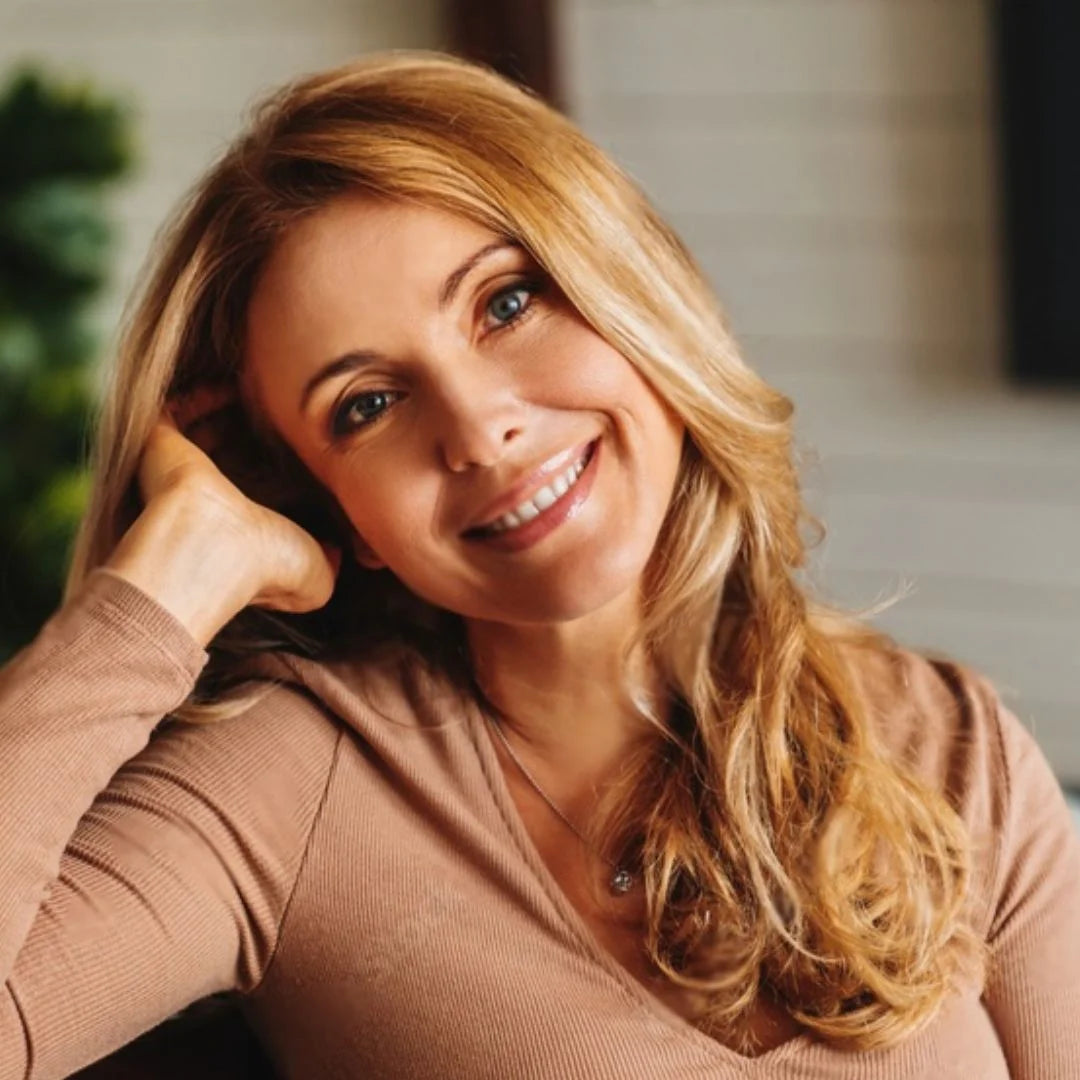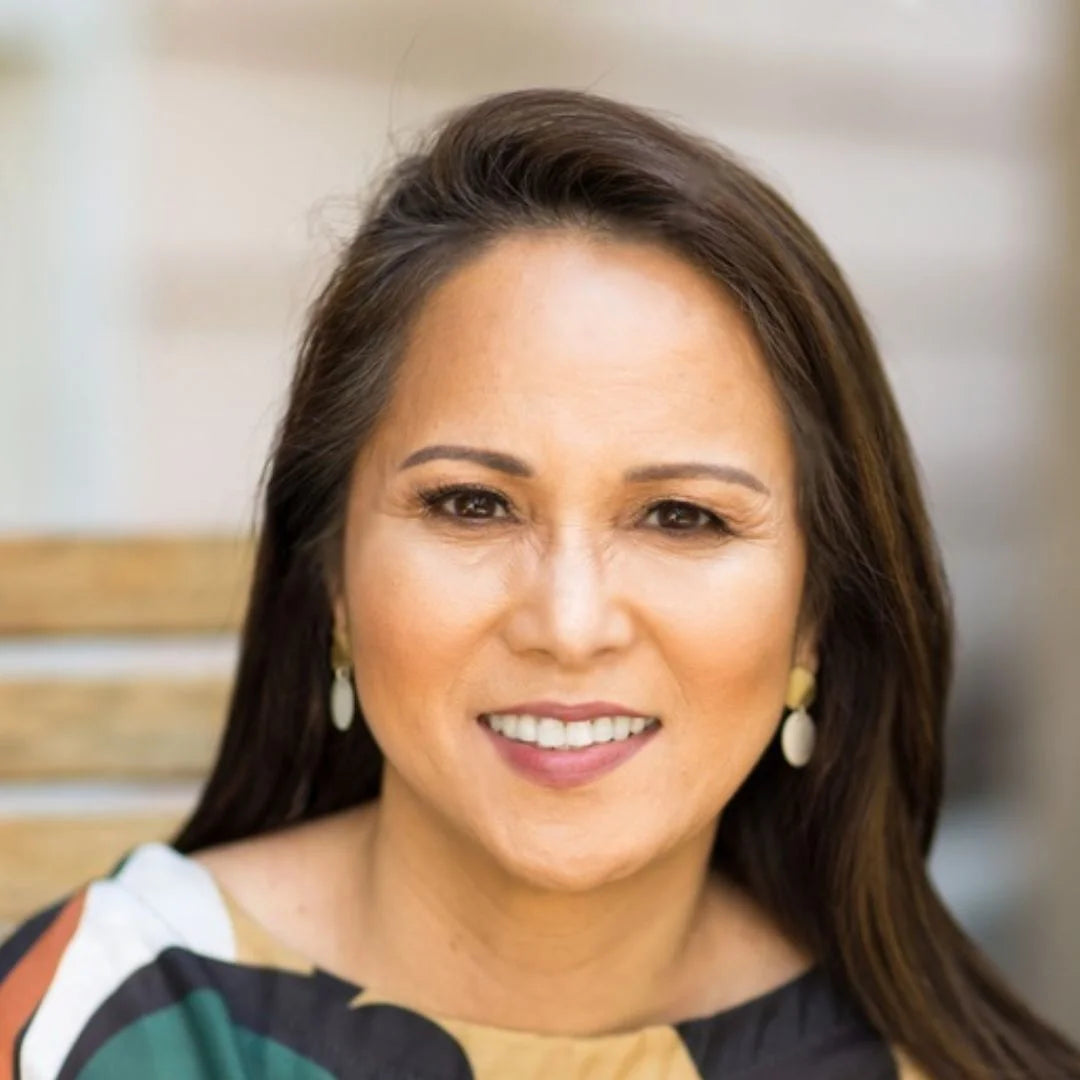
Boosting Hair Growth with Essential Vitamins Post-pregnancy
Share
The post-pregnancy phase is both beautiful and demanding. A major concern for many women during this time is the challenge of post-pregnancy hair growth. Hair thinning or loss is not just a superficial issue; it deeply impacts a woman's overall well-being. Central to enhancing post-pregnancy hair growth are vitamins. They serve a dual purpose: nourishing the scalp and hair follicles and strengthening hair strands. By doing so, they play a crucial role in promoting post-pregnancy hair growth and warding off breakage.

The Science Behind Hair Growth
Have you ever wondered about the intricacies of hair growth? Each strand on our heads follows a unique growth cycle. Understanding this cycle offers valuable insights into how we can nurture and support our hair, especially post-pregnancy.
The Hair Growth Cycle
Hair doesn't grow continuously. It has phases. The first phase, known as the 'Anagen' phase, is when the hair grows. This phase lasts for 2-7 years. The second, 'Catagen', is a transitional phase lasting around 2-3 weeks. The final 'Telogen' phase is a resting period. Post-pregnancy, many women find a higher number of hairs in the Telogen phase, leading to increased hair fall.

How Pregnancy Affects the Hair Growth Cycle
Pregnancy brings with it a surge of hormones, especially estrogen. This hormone elongates the Anagen phase, leading to lesser hair fall and thicker, shinier hair during pregnancy. However, post-delivery, as hormone levels normalize, a larger number of hairs transition to the Telogen phase, leading to noticeable hair shedding. It's a natural process and understanding it helps in managing and mitigating its effects.

Essential Vitamins for Hair Growth Post-Pregnancy
Vitamin A
Vitamin A is pivotal for cell growth, and this includes hair, the fastest-growing tissue in the human body. It helps skin glands produce sebum, an oily substance that moisturizes the scalp and keeps hair healthy. Carrots, sweet potatoes, spinach, and kale are all rich in beta-carotene, which the body converts into vitamin A. While vitamin A is essential, excessive intake can counteract its benefits, leading to hair loss. Thus, it's crucial to maintain a balance.
Vitamin E
This antioxidant boosts hair health by preventing oxidative stress and increasing blood circulation to the scalp. Sunflower seeds, almonds, spinach, and avocados are all excellent sources. However, while it's beneficial, it's essential to note that excessive vitamin E can reduce blood clotting, so always consult with a healthcare professional before starting any supplementation.
Vitamin D
Low levels of vitamin D are linked to alopecia, a technical term for hair loss. Vitamin D stimulates hair follicles, ensuring robust hair growth. Sun exposure is the most direct way to get vitamin D, but it's also found in fatty fish, cod liver oil, and fortified foods. Given the limited natural sources, supplementation might be necessary, but it's always best to get a professional opinion first.
Biotin (Vitamin B7)
Biotin's importance for hair health can't be overstated. It plays an instrumental role in the production of keratin, the primary protein that makes up hair. Eggs, almonds, spinach, and sweet potatoes are rich in biotin. Although biotin deficiency is rare, post-pregnancy changes can sometimes lead to a reduction, affecting hair health.
Folic Acid (Vitamin B9)
Folic acid aids in tissue growth and cell function. It also rejuvenates hair follicles, promoting healthy hair growth. Leafy greens, oranges, and fortified cereals are great sources. Combining folic acid with other B vitamins amplifies its effects, ensuring lustrous and thick hair.

Importance of Minerals for Hair Health Post-Pregnancy
Iron
Iron is a vital mineral that hair follicles require to maintain robust growth. An iron deficiency, commonly seen post-pregnancy, can lead to hair loss. This is because iron aids the red blood cells in carrying oxygen to all body cells, including hair follicles. Excellent sources of iron include spinach, lentils, eggs, and red meat. It's pivotal to keep an eye on iron levels, especially post-pregnancy, to ensure that the hair remains healthy and vibrant.
Zinc
Zinc plays a crucial role in hair tissue repair and growth. It also ensures that the oil glands surrounding hair follicles work optimally. However, similar to certain vitamins, an excess of zinc can spell trouble by promoting hair loss. Foods rich in zinc include pumpkin seeds, lentils, and beef.
Selenium
A trace element, selenium, is vital for hair health. It aids in the creation of hair growth proteins. Furthermore, selenium's antioxidant properties protect hair follicles from damage by environmental factors. Foods like Brazil nuts, fish, and eggs are rich in selenium. Yet, an overabundance of this mineral can lead to hair loss, so moderation is key.

Tailoring Diet and Lifestyle for Optimal Hair Growth
Embracing a Balanced Diet
It's often said, "You are what you eat." When it comes to hair health post-pregnancy, this adage rings particularly true. Incorporating a diverse range of vitamins and minerals into one's diet ensures that hair follicles receive the nourishment they require. Prioritizing foods rich in antioxidants, Omega-3 fatty acids, proteins, and biotin can go a long way in boosting hair growth.

Reducing Stress
The link between stress and hair loss is well-documented. Post-pregnancy, women often juggle numerous responsibilities, which can lead to increased stress levels. Engaging in relaxation techniques such as meditation, deep breathing exercises, and regular physical activity can aid in keeping stress at bay, promoting overall well-being and, by extension, hair health.

Regular Hair Care Routine
Incorporating a consistent hair care routine post-pregnancy can make a significant difference. This includes gentle brushing, avoiding excessive heat styling, and using products tailored to one's hair type. Moreover, regular scalp massages can stimulate blood flow, promoting hair growth.
Proactive Approaches for Hair Health
Using the Right Hair Products
Opting for hair products that align with one's hair type and specific needs is paramount. For instance, products fortified with keratin can strengthen hair, while those with natural oils can moisturize and nourish the scalp and strands.
Proactive Rosemary Hair Booster Oil
Introducing the Proactive Rosemary Hair Booster oil - a blend curated specifically for post-pregnancy hair needs. Enriched with the goodness of rosemary, this oil stimulates the scalp, promoting hair growth. Rosemary is known for its circulatory benefits, ensuring that hair follicles receive an adequate blood supply. By incorporating this oil into your routine, you're not just nourishing your hair but also providing it with the extra boost it needs post-pregnancy.
Practical Hair Care Tips for New Mothers
Opt for Low-Maintenance Haircuts
During the initial months post-pregnancy, it might be challenging to allocate time for elaborate hair care routines. Thus, choosing a low-maintenance haircut can save both time and effort, reducing stress on the hair and the mind.
Avoid Tight Hairstyles
Tight hairstyles, such as ponytails or braids, can strain the hair follicles. Given the fragile state of post-pregnancy hair, it's advisable to opt for loose hairstyles that don't pull or stress the hair unduly.
Limit Heat Styling
Excessive use of heat-styling tools can weaken the hair structure. If possible, air-dry your hair more frequently and limit the usage of straighteners, curlers, and blow dryers. When using these tools, always use a heat protectant to shield the hair.

Consider Supplements with a Doctor’s Guidance
Collagen
Collagen, a protein found in our body, supports hair health by providing amino acids that can build hair. Supplements can help restore collagen levels in the body, especially if one's diet is lacking.
Biotin
Although biotin deficiency is rare, it can cause hair thinning. If you suspect a deficiency, consult with your doctor, who might recommend biotin supplements to enhance hair health.
Folic Acid
Folic acid is pivotal during pregnancy, but its benefits extend post-pregnancy too. It can support cell division in hair follicles, leading to thicker and healthier hair.

Nurturing Hair Growth from Within
Understanding that external treatments are just a part of the solution is crucial. Mental well-being, balanced nutrition, and inner health play significant roles in hair health. Stay hydrated, prioritize sleep, and ensure a balanced diet. Engage in activities that uplift your spirit, as a happy mind often translates to a healthy body.

Final Thoughts on Post-Pregnancy Hair Growth
The journey post-pregnancy can be both exhilarating and challenging. While the body undergoes numerous changes, with the right care and attention, one can ensure that hair health doesn't take a backseat. Remember, patience is key. Hair growth and recovery, like all good things, take time.
By embracing a balanced diet, reducing stress, adopting a regular hair care routine, and potentially using products like the Proactive Rosemary Hair Booster oil, you can pave the way for healthier, more radiant hair post-pregnancy.
Frequently Asked Questions (FAQ)
How long does post-pregnancy hair loss last?
Typically, post-pregnancy hair loss peaks around four months after giving birth and can continue for several months. However, by the child's first birthday, most mothers experience a return to their normal hair growth and shedding patterns.
Can I prevent post-pregnancy hair loss?
It's challenging to prevent this entirely, as it's a natural process. However, maintaining a healthy diet, managing stress, and following a gentle hair care routine can help mitigate the effects.
Are there any specific ingredients I should avoid in hair products post-pregnancy?
It's always good to consult with a dermatologist or trichologist. Generally, try to avoid products with harsh chemicals, sulfates, and alcohols, as they can be drying and damaging.















